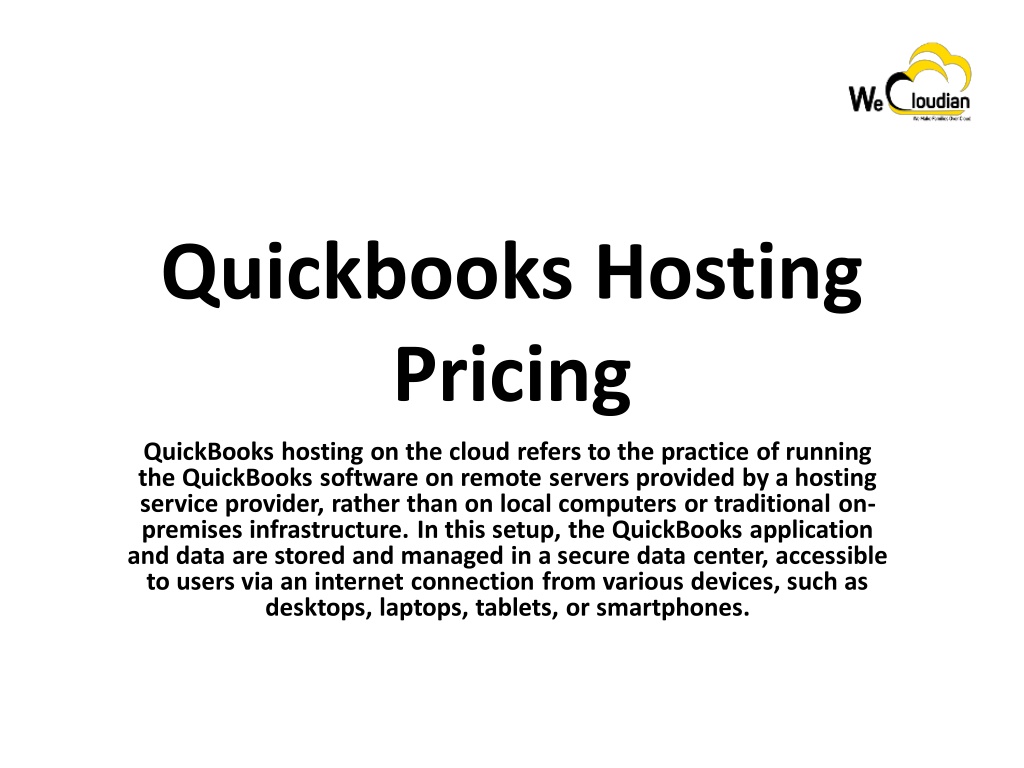QuickBooks Hosting Pricing: A Comprehensive Guide

Source www.slideserve.com
Hey Readers!
Are you searching for QuickBooks hosting pricing that fits your business perfectly? Look no further! In this ultimate guide, we’ll dive deep into the world of QuickBooks hosting solutions, exploring different pricing models, plans, and offerings. Get ready to optimize your business’s accounting operations while maximizing your budget.
Types of QuickBooks Hosting
QuickBooks Desktop Hosting
QuickBooks Desktop Hosting provides cloud access to your QuickBooks Desktop software. This option lets you continue using your familiar desktop interface while eliminating the need for local storage and maintenance.
QuickBooks Online Hosting
QuickBooks Online Hosting offers a fully web-based version of QuickBooks. It allows you to access your financial data anytime, anywhere, without the hassle of installing or updating software.
Pricing Factors
Number of Users
The number of users who will access the QuickBooks software affects the pricing plan you’ll need. Each user typically requires a separate license, so consider the number of employees or users who need access.
Storage Space
The amount of storage space you require depends on the volume of financial data and documents you’ll be storing in QuickBooks. Higher storage limits often come with a higher price tag.
Features and Integrations
Some QuickBooks hosting providers offer additional features and integrations. These can include enhanced security measures, advanced reporting capabilities, or integrations with other business applications. The more features you need, the higher the cost may be.
Popular Pricing Plans
QuickBooks Desktop Hosting
- Basic Plan: Typically includes basic features, limited user access, and modest storage space. Pricing starts around $20 per user per month.
- Standard Plan: Offers more features, increased user access, and higher storage limits. Pricing ranges from $40 to $80 per user per month.
- Premium Plan: Includes advanced features, unlimited user access, and the largest storage capacity. Costs can exceed $100 per user per month.
QuickBooks Online Hosting
- Essentials Plan: Provides basic accounting features and limited user access. Pricing starts around $25 per month.
- Plus Plan: Offers more advanced features, including project tracking and inventory management. Pricing ranges from $50 to $150 per month.
- Advanced Plan: Includes advanced features, such as budgeting, forecasting, and reporting capabilities. Pricing starts around $200 per month.
Price Comparison Table
| Provider | Plan | Users | Storage | Features | Price |
|---|---|---|---|---|---|
| Intuit | QuickBooks Desktop Hosting | 5 | 50 GB | Basic | $25/user/month |
| RightNetworks | QuickBooks Online Hosting | 10 | 250 GB | Standard | $45/user/month |
| Cloud9 | QuickBooks Desktop and Online Hosting | Unlimited | 1 TB | Premium | $75/user/month |
| Apps4Rent | QuickBooks Online Hosting | 25 | 500 GB | Advanced | $100/user/month |
Conclusion
With various QuickBooks hosting pricing options available, it’s crucial to choose a plan that meets your business’s needs and budget. Explore the different plans, compare pricing, and consider the number of users, storage requirements, and features you need. Check out our other articles for more insights into QuickBooks and other business software solutions.
## FAQ about QuickBooks Hosting Pricing
1. What is QuickBooks hosting?
Answer: QuickBooks hosting is a service that lets you access your QuickBooks software and data online, instead of installing it on your local computer.
2. What are the benefits of QuickBooks hosting?
Answer: QuickBooks hosting offers several benefits, including:
3. How much does QuickBooks hosting cost?
Answer: QuickBooks hosting pricing varies depending on the provider you choose and the plan you select.
4. What should I look for when choosing a QuickBooks hosting provider?
Answer: When choosing QuickBooks hosting provider, you should consider the following factors:
5. How do I get started with QuickBooks hosting?
Answer: Getting started with QuickBooks hosting is easy. Simply choose a provider, select a plan, and sign up for the service.
6. What are the different types of QuickBooks hosting?
Answer: There are two main types of QuickBooks hosting:
7. What is the best QuickBooks hosting provider?
Answer: The best QuickBooks hosting provider for you will depend on your specific needs and budget. However, some of the most popular QuickBooks hosting providers include:
8. Can I use QuickBooks hosting with my existing QuickBooks software?
Answer: Yes, you can use QuickBooks hosting with your existing QuickBooks software. However, you will need to purchase a QuickBooks hosting plan that is compatible with your version of QuickBooks.
9. Is QuickBooks hosting secure?
Answer: Yes, QuickBooks hosting is secure. QuickBooks hosting providers use a variety of security measures to protect your data, including firewalls, intrusion detection systems, and encryption.
10. What are the advantages of QuickBooks hosting over using QuickBooks desktop?
Answer: QuickBooks hosting offers several advantages over using QuickBooks desktop, including:
